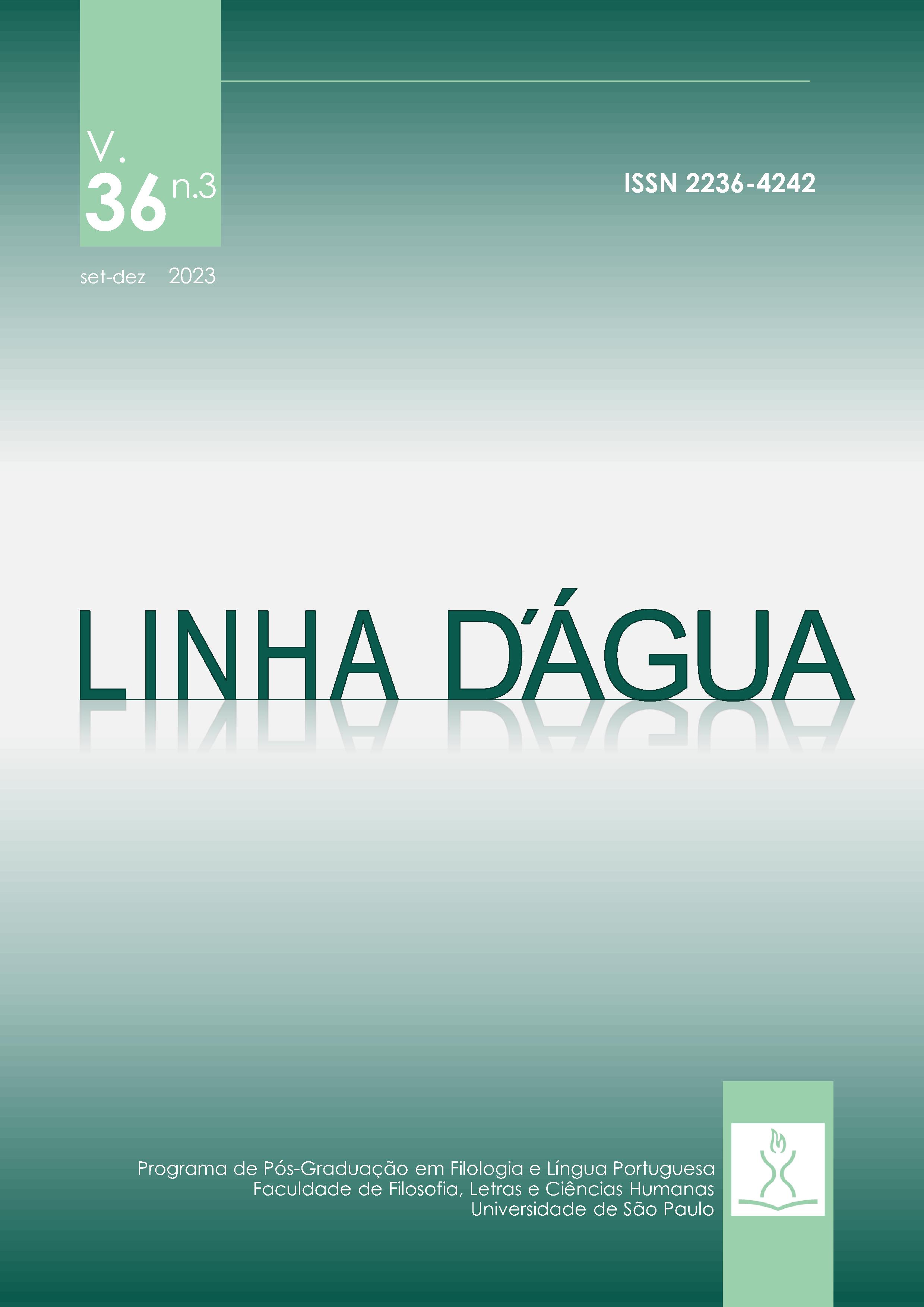Competencias de liderazgo intermedio para promover la argumentación en el aula de matemáticas
DOI:
https://doi.org/10.11606/issn.2236-4242.v36i3p369-386Palavras-chave:
Matemática, Desarrollo de la argumentación, Liderazgo intermedio, Desarrollo profesional docente, Noticing, Mejoramiento de la Experiencia Docente (MED)Resumo
Para fortalecer el desarrollo profesional docente, se requieren propuestas formativas de carácter colaborativo, que consideren competencias de liderazgo intermedio para monitorear, retroalimentar y modelar la práctica. En este artículo, se presenta una experiencia de formación dirigida a 27 líderes intermedios de 11 establecimientos educativos, en que se utiliza el modelo formativo “Mejoramiento de la Experiencia Docente” (MED) para que acompañen a docentes en el desarrollo de la argumentación en el aula de matemáticas. Mediante el análisis de esta experiencia se muestra de qué manera características y etapas del MED tales como problematizar la práctica del profesor, generar conflicto cognitivo en el docente, suscitar las ideas de los profesores y promover que los docentes analicen evidencias en el aula se relaciona con las tres competencias de un líder intermedio para monitorear, retroalimentar y modelar prácticas.
Downloads
Referências
AMADOR, J. Teacher Leaders Mathematical Noticing: Eliciting and Analyzing. International Journal of Science and Mathematics Education, v. 18, p. 295–313. 2020. DOI: http://doi.org/10.1007/s10763-019-09956-5.
AN, S.; PETER-KOOP. A. In-Service Education, Professional Development of Mathematics Teachers. In: CHO. S. (ed). The Proceedings of the 12th International Congress on Mathematical Education. Intellectual and Attitudinal Challenges Heidelberg. New York Dordrecht London: Springer Open, 2015. p. 513-516.
AVALOS-BEVAN, B; BASCOPÉ, M. Teacher Informal Collaboration for Professional Improvement: Beliefs, Contexts, and Experience. Education Research International, v. 2017, p. 1357180, 2017. DOI: https://doi.org/10.1155/2017/1357180.
AYALON, M.; HERSHKOWITZ, R. Mathematics teachers’ attention to potential classroom situations of argumentation. Journal of Mathematical Behavior, v. 49, p. 163-173, 2018. Disponible en: https://www.sciencedirect.com/science/article/abs/pii/S0732312317301141?via%3Dihub. Acceso en: 25 jun. 2023.
BENNETT, N. Assessing the impact on practice of professional development activities. Sage Publications, 2003
BERKOWITZ, D.; FERNÁNDEZ, M.; ZORO, B. Una revisión al Desarrollo Profesional Directivo y de Nivel Intermedio en el contexto del desafío de creación del Sistema de Educación Pública. Informe técnico. Informe Técnico Nº 3. LÍDERES EDUCATIVOS, Centro de Liderazgo para la Mejora Escolar. 2019.
BORKO, H.; CARLSON, J.; DEUTSCHER, R. ET AL. Learning to Lead: an Approach to Mathematics Teacher Leader Development. International Journal of Science and Mathematics Education. v. 9, p. 121-143, 2021. DOI: https://doi.org/10.1007/s10763-021-10157-2.
CERVANTES-BARRAZA, J.; CABAÑAS-SÁNCHEZ, G.; ORDOÑEZ-CUASTUMAL, S. El poder persuasivo de la refutación en argumentaciones colectivas. Bolema - Mathematics Education Bulletin, v. 31. n. 59, p. 861-879, 2017. Disponible en: https://www.scielo.br/j/bolema/a/k77PKndWNSkSWGkxDpKRWGB/abstract/?lang=es. Acceso en: 25 jun. 2023.
CONNER, A. M.; SINGLETARY, L. M.; SMITH, R. C.; WAGNER, P. A.; FRANCISCO, R. T. Teacher support for collective argumentation: A framework for examining how teachers support students’ engagement in mathematical activities. Educational Studies in Mathematics, v. 86, n. 3, p. 401-429, 2014. Disponible en: https://link.springer.com/article/10.1007/s10649-014-9532-8. Acceso en: 25 jun. 2023.
DINHAM, S. The secondary Head of Department and the achievement of exceptional student outcomes. Journal of Educational Administration, v. 45. n. 1, p. 62–79. 2007. DOI: https://doi.org/10.1108/09578230710722458.
EDUCA, F. B. Proyecto Educativo Institucional. Santiago, Chile. 2017
ESPAÑA. Real Decreto 157, de 1 de marzo de 2022. Por el que se establecen la ordenación y las enseñanzas mínimas de la educación primaria. Boletín oficial del estado, Madrid, n. 52, p. 24386-24504, de 3 de marzo de 2022. Disponible en: https://www.boe.es/buscar/act.php?id=BOE-A-2022-3296. Acceso en: 19 abr. 2023.
GIBBONS, L.; KAZEMI, K.; LEWIS, R. Developing collective capacity to improve mathematics instruction: Coaching as a lever for school-wide improvement. The Journal of Mathematical Behavior, v. 46, p. 231-250, 2017. DOI: https://doi.org/10.1016/j.jmathb.2016.12.002.
GOODCHILD, S. Mathematics teaching development: Learning from developmental research in Norway. ZDM - International Journal on Mathematics Education, v. 46, p. 305–316. 2014. DOI: https://doi.org/10.1007/s11858-013-0567-6.
GOIZUETA, M.; PLANAS, N. Temas emergentes del análisis de interpretaciones del profesorado sobre la argumentación en clase de matemáticas. Enseñanza de las Ciencias, v. 31, n. 1, p. 61-78. 2013.
GOIZUETA, M.; SOLAR, H. Relaciones entre la argumentación en el aula de matemáticas y la mirada profesional del profesor. In: OLFOS, R; RAMOS, E.; ZAKARYAN, D. (ed.). Formación docente: Aportes a la práctica docente desde la didáctica de la matemática, Barcelona, Graó, 2019, p. 241-280.
INGLIS, M.; MEJIA-RAMOS, J. P.; SIMPSON, A. Modelling mathematical argumentation: The importance of qualification. Educational Studies in Mathematics, v. 66, p. 3-21. 2007. DOI: https://doi.org/10.1007/s10649-006-9059-8.
HIGHFIELD, C. The impact of middle leadership practices on student academic outcomes in New Zealand secondary schools. [Tesis Doctoral, Universidad de Auckland, Auckland], 2012. Disponible en https://researchspace.auckland.ac.nz/handle/2292/19796.
KRUMMHEUER, G. The ethnography of argumentation. In: COBB, P.; BAUERSFELD. H. (ed.). The emergence of mathematical meaning: Interaction in classroom cultures. Hillsdale: Lawrence Erlbaum, 1995. p. 229-269.
LESSEIG, K.; ELLIOTT, R.; KAZEMI, E.; KELLEY-PETERSEN, M.; CAMPBELL, M., MUMME, J.; CARROLL, C. Leader noticing of facilitation in videocases of mathematics professional development. Journal of Mathematics Teacher Education, v. 20, n. 6, p. 591–619. 2017. DOI: https://doi.org/10.1007/s10857-016-9346-y.
LINEK, W.; PADAK, N.; RASINSKI, T.; STURTEVANT, E. Mentoring Literacy Researchers. Journal of Literacy Research, v. 35, n. 4, p. xi–xiv. 2003.
MINISTERIO DE EDUCACIÓN DE CHILE- MINEDUC. Bases curriculares chilenas 7o básico a 2o medio. Santiago: Mineduc, 2013.
MINISTERIO DE EDUCACIÓN DE CHILE -MINEDUC. Fundamentos Modelo de Desarrollo de Capacidades para el Apoyo Técnico-Pedagógico. Santiago: Dirección de Educación Pública. División de desarrollo Educativo. 2022.
NISS, M; HØJGAARD, T. Mathematical competencies revisited. Educational Studies in Mathematics, v. 102, p. 9-28, jun. 2019. DOI: https://doi.org/10.1007/s10649-019-09903-9.
ORGANIZATION FOR ECONOMIC COOPERATION AND DEVELOPMENT - OECD. PISA 2018 Assessment and Analytical Framework (PISA). Paris: OECD, 2019. Disponible en: https://www.oecd-ilibrary.org/education/pisa-2018-assessment-and-analytical-framework_b25efab8-en. Acceso en: 19 abr. 2023.
REID, D.; KNIPPING, C.; CROSBY, M. Refutations and the logic of practice. PNA, v. 6, n. 1, p. 1-10, jul 2011.
RHODES, C.; BRUNDRETT, M. Growing the leadership talent pool: perceptions of heads, middle leaders and classroom teachers about professional development and leadership succession planning within their own schools. Professional Development in Education, v. 35, n. 3, p. 381–398. 2009. DOI: https://doi.org/10.1080/19415250902987122.
RITCHIE, S. M.; MACKAY, G.; RIGANO, D. L. Individual and collective leadership in school science departments. Research in Science Education, v. 36, n. 3, p. 141–161. 2006. DOI: https://doi.org/10.1007/s11165-005-9001-6.
ROBINSON, V.; HOHEPA, M.; LLOYD, C. School Leadership and Student Outcomes: Identifying what works and why. Winmalee: Australian Council for Educational Leaders. 2007.
ROESKEN, B. Hidden Dimensions in the Professional Development of Mathematics Teachers. In-service Education for and with teachers. Rotterdam: Sense Publishers, 2011.
ROGERS, M. P.; ABELL, S.; LANNIN, J.; WANG, C. Y.; MUSIKUL, K.; BARKER, D.; DINGMAN, S. Effective professional development in science and mathematics education: Teachers' and facilitators' views. International journal of science and mathematics education, v. 5, n. 3, p. 507-532. 2007. DOI: https://doi.org/10.1007/s10763-006-9053-8.
SÁNCHEZ-MATAMOROS, G.; FERNÁNDEZ, C.; LLINARES, S. Developing pre-service teachers’ noticing of students’ understanding of the derivative concept. International Journal of Science and Mathematics Education, v. 13, n. 6, p. 1305–1329. 2015. DOI: https://doi.org/10.1007/s10763-014-9544-y.
SCHOENFELD, A. H. Toward professional development for teachers grounded in a theory of decision making. ZDM Mathematics Education, v. 43, p. 457–469. 2011. DOI: https://doi.org/10.1007/s11858-011-0307-8.
SEPÚLVEDA, R.; VOLANTE, P.; MONTENEGRO, M. Validación de un cuestionario de liderazgo intermedio para profesores responsables de un departamento didáctico. Revista complutense de educación, v. 33, n. 3, p. 435-445. 2022. DOI: https://doi.org/10.5209/rced.74479.
SHAPIRA-LISHCHINSKY, O.; LEVY-GAZENFRANTZ, T. Authentic leadership strategies in support of mentoring processes. School Leadership & Management, v. 35, n. 2, p. 183–201. 2015. DOI: https://doi.org/10.1080/13632434.2014.992777.
SHERIN, M. G.; JACOBS, V. R.; PHILLIP, R. A. Situating the study of teacher noticing. In SHERIN, M. G.; JACOBS, V. R.; PHILIPP R. A. (ed.), Mathematics teacher noticing: Seeing through teachers’ eyes. New York: Routledge. 2011. p. 3–13. DOI: https://doi.org/10.1080/13632434.2014.992777.
SHERIN, M. G.; VAN ES, E. A. Effects of video club participation on teachers’ professional vision. Journal of Teacher Education, v. 60, n. 1, p. 20–37. 2009. DOI: https://doi.org/10.1177/0022487108328155.
SHULMAN, L. Those who understand: knowledge growth in teaching. Educational Researcher, v 15, n. 2, p. 4–14. 1986. DOI: https://doi.org/10.2307/117586.
SOLAR, H.; DEULOFEU, J. Condiciones para promover el desarrollo de la competencia de argumentación en el aula de matemáticas. Bolema - Mathematics Education Bulletin, v. 30, n. 56, 1092–1112. 2016. Disponible en https://www.scielo.br/j/bolema/a/LRQCNDLqMwwbtcHfhyf5LDs/?lang=es. Acceso en: 25 jun. 2023.
SOLAR, H.; ORTIZ, A.; DEULOFEU, J.; ULLOA, J. Teacher support for argumentation and the incorporation of contingencies in mathematics classrooms. International Journal of Mathematical Education in Science and Technology, v. 52, n. 7, p. 977-1005. 2021. Disponible en https://www.tandfonline.com/doi/full/10.1080/0020739X.2020.1733686. Acceso en: 25 jun. 2023.
SOLAR, H.; ORTIZ, A.; ULLOA, R. MED: Modelo de formación continua para profesores de matemática, basada en la experiencia. Estudios Pedagógicos, v. 42, n. 4, p. 281-298. 2016. Disponible en https://www.scielo.cl/scielo.php?pid=S0718-07052016000500016&script=sci_arttext. Acceso en: 25 jun. 2023.
STAHNKE, R., SCHUELER, S.; ROESKEN-WINTER, B. Teachers’ perception, interpretation, and decision-making: a systematic review of empirical mathematics education research. ZDM Mathematics Education, v, 48, p. 1-27. 2016. DOI: http://doi.org/10.1007/s11858-016-0775-y.
TOULMIN, S. The uses of argument. Reino Unido, Cambridge, MA: Cambridge University Press. 2003.
VAN EEMEREN, F. H.; GROOTENDORST, R.; JOHNSON, R. H.; PLANTIN, C.; WILLARD, C. A. Fundamentals of argumentation theory: A handbook of historical backgrounds and contemporary developments. Routledge, 2013.
VERGARA, C; COFRÉ, H. Conocimiento pedagógico del contenido: ¿el paradigma perdido en la formación inicial y continua de profesores en chile? Revista Estudios Pedagógicos, v. 15 (Número Especial 1), p. 323-338. 2014. DOI: http://doi.org/10.4067/S0718-07052014000200019.
YACKEL, E. What we can learn from analyzing the teacher’s role in collective argumentation. Journal of Mathematical Behavior, v. 4, n. 21, p. 423-440, 2002. DOI: http://doi.org/10.1016/S0732-3123(02)00143-8.
Downloads
Publicado
Edição
Seção
Licença
Direitos autorais (c) 2023 Horacio Solar, Pilar Peña-Rincón, Andrés Ortiz

Este trabalho está licenciado sob uma licença Creative Commons Attribution-NonCommercial 4.0 International License.
A aprovação dos manuscritos implica cessão imediata e sem ônus dos direitos de publicação para a Linha D'Água. Os direitos autorais dos artigos publicados pertencem à instituição a qual a revista encontra-se vinculada. Em relação à disponibilidade dos conteúdos, a Linha D'Água adota a Licença Creative Commons, CC BY-NC Atribuição não comercial. Com essa licença é permitido acessar, baixar (download), copiar, imprimir, compartilhar, reutilizar e distribuir os artigos, desde que para uso não comercial e com a citação da fonte, conferindo os devidos créditos autorais à revista.
Nesses casos, em conformidade com a política de acesso livre e universal aos conteúdos, nenhuma permissão é necessária por parte dos autores ou do Editor. Em quaisquer outras situações a reprodução total ou parcial dos artigos da Linha D'Água em outras publicações, por quaisquer meios, para quaisquer outros fins que sejam natureza comercial, está condicionada à autorização por escrito do Editor.
Reproduções parciais de artigos (resumo, abstract, resumen, partes do texto que excedam 500 palavras, tabelas, figuras e outras ilustrações) requerem permissão por escrito dos detentores dos direitos autorais.
Reprodução parcial de outras publicações
Citações com mais de 500 palavras, reprodução de uma ou mais figuras, tabelas ou outras ilustrações devem ter permissão escrita do detentor dos direitos autorais do trabalho original para a reprodução especificada na revista Linha D'Água. A permissão deve ser endereçada ao autor do manuscrito submetido. Os direitos obtidos secundariamente não serão repassados em nenhuma circunstância.
Dados de financiamento
-
Agencia Nacional de Investigación y Desarrollo
Números do Financiamento 1231303











